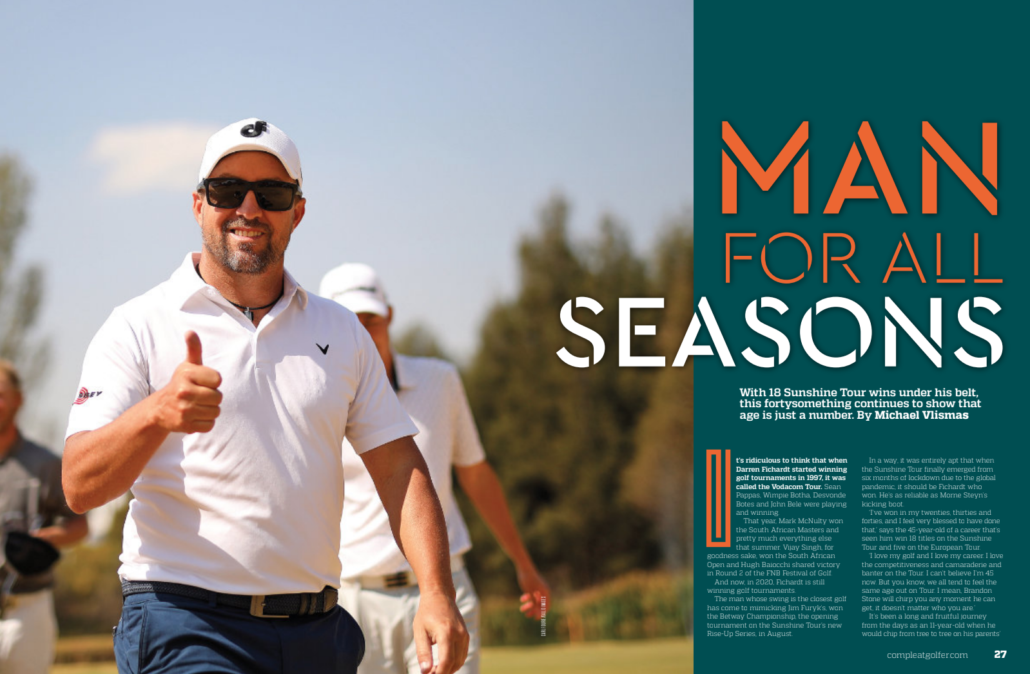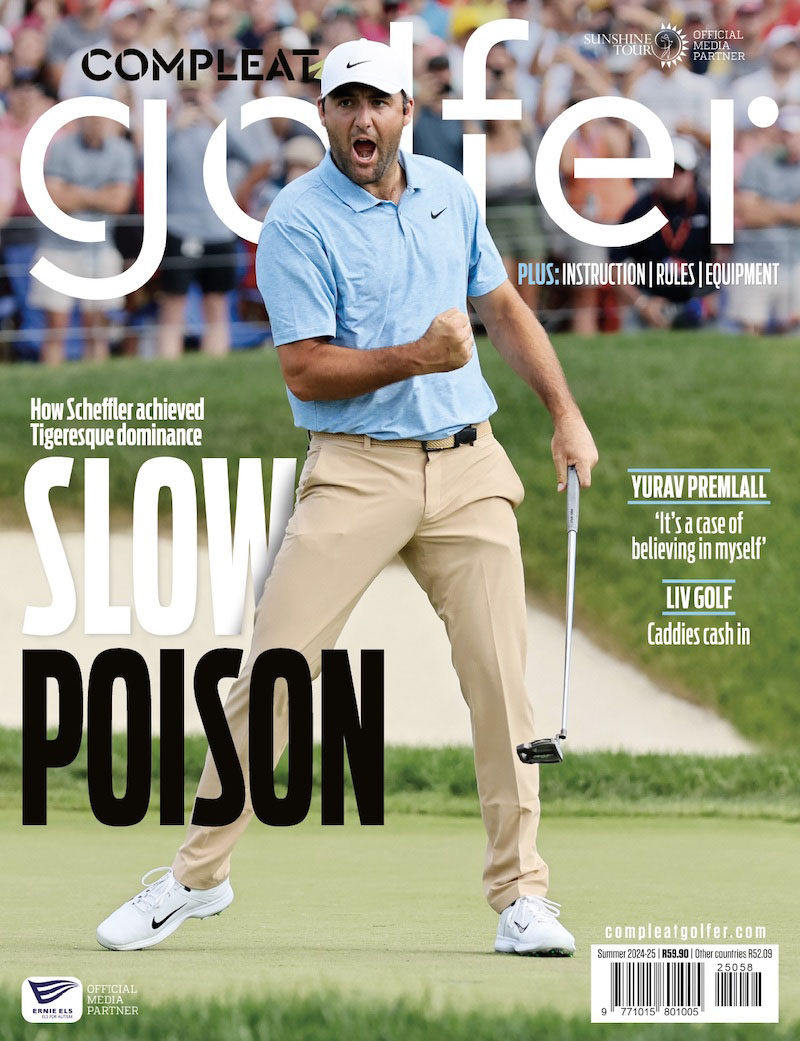With 18 Sunshine Tour wins under his belt, this fortysomething continues to show that age is just a number, writes MICHAEL VLISMAS.
It’s ridiculous to think that when Darren Fichardt started winning golf tournaments in 1997, it was called the Vodacom Tour. Sean Pappas, Wimpie Botha, Desvonde Botes and John Bele were playing and winning.
That year, Mark McNulty won the South African Masters and pretty much everything else that summer. Vijay Singh, for goodness sake, won the South African Open and Hugh Baiocchi shared victory in Round 2 of the FNB Festival of Golf.
And now, in 2020, Fichardt is still winning golf tournaments.
FROM THE MAG: October issue on sale now!
The man whose swing is the closest golf has come to mimicking Jim Furyk’s, won the Betway Championship, the opening tournament on the Sunshine Tour’s new Rise-Up Series, in August.
In a way, it was entirely apt that when the Sunshine Tour finally emerged from six months of lockdown due to the global pandemic, it should be Fichardt who wins. He’s as reliable as Morne Steyn’s kicking boot.=
‘I’ve won in my twenties, thirties and forties, and I feel very blessed to have done that,’ says the 45-year-old of a career that’s seen him win 18 titles on the Sunshine Tour and five on the European Tour.
‘I love my golf and I love my career. I love the competitiveness and camaraderie and banter on the Tour. I can’t believe I’m 45 now. But you know, we all tend to feel the same age out on Tour. I mean, Brandon Stone will chirp you any moment he can get, it doesn’t matter who you are.’
It’s been a long and fruitful journey from the days as an 11-year-old when he would chip from tree to tree on his parents’ smallholding in Raslow outside Pretoria, or cycle 12km to his nearest golf club to practise.
From the days when schoolteachers advised him not to even think about a career as a professional golfer. And when even later, when he did indeed turn professional in 1994, experienced professionals told him he’d never make it with that swing.
‘My swing is not textbook, so I had a lot of people advising me against pro golf. A few teachers at school told me to rather focus on rugby or academics. I was a half-decent flyhalf, but I loved golf. When I was a junior there wasn’t much coaching. It was all about feel. My dad knew nothing about the technical side of golf, and with me doing most of my practising at home, it was always about feel. I think that’s why my short game is so good because I’ve never been technical about it. I’ve always just felt it. As I got better the critics started saying things like, “How do you plan on making a living out of golf with a swing like that?” But luckily I didn’t listen too much.’
And therein lies the secret to the ongoing success of Darren Clive Fichardt. He doesn’t listen to everybody.
‘Fortunately I have a little bit of the water-off-a-duck’s-back attitude. I believe nothing is impossible, so I could push past that criticism. I believe you get positive people, realists and negative people. In our career, you need the mindset that you can achieve anything. But there are lots of people out there who don’t think like that. So when you tell them you’re off to go play in a European Tour event, they’ll respond with something like, “Jeez, Martin Kaymer and Lee Westwood are playing there and they’re really good.” It’s crazy. If you hang around people like that, you start doubting yourself. So I always keep my circle very tight and as soon as I pick up any negative talk I shy away from it.’
The result is there is very select few he listens to.
‘I’ve had great mentors in my life, and Tony Jacklin helped me a lot early in my career. He always spoke about worrying only about rhythm. His mindset was focused on rhythm and nothing technical. I’ve always liked that. I’ve always believed in keeping it simple.
ALSO READ: Ernie on SAS Champs win
‘After I turned pro, my dad gave me two years to make it. I was like, “Jeez, only two years? OK.” But then I won my first Sunshine Tour event in 1997. And my big breakthrough came when I won the Sunshine Tour Order of Merit in the 1999-2000 season. That came as a bit of a shock. I just wanted to win my second or third event on Tour and was trying to make cash to buy a house. So to win the money list was a shock.’
It was a triumph built on adversity, and a very necessary push from his wife Natasha to get out into the big wide world and truly challenge himself.
‘I knew I had the ability to play well, but I’d started becoming complacent at home. That’s when Natasha told me, “Listen, you need to get out there. It’s time to leave the nest.” I was like, “What are you talking about? I’m happy where I am.” But she insisted I need to challenge myself out there. So I decided to go play the Canadian Tour. Let me tell you, it was probably the hardest time of my life. I went to Canada with only R3 000 in my pocket, so I had to play well. And then I had the critics telling me I was crazy going over there, and that the fields there were so good and as South Africans we just couldn’t compete on their level. There was a lot of that negativity in my head. I think by the time I climbed on the flight I was almost in tears, wondering what I was doing. So I was just trying to survive out there and make it to the end of the season.
‘When I came back I thought I’d learned nothing from what had felt like the worst five months of my life. But then I came home and won my first tournament back and it felt a lot easier than normal. Then I got into the summer Tour and almost won the South African Open, and things were happening so much easier. Then I realised that the adversity I faced in Canada helped me grow as a player. I would never have had that growth staying at home.’
In 2001 Fichardt won his first European Tour event – the Sao Paulo Brazil Open – and then added the 2003 Qatar Masters. Back home, he won the Sunshine Tour Order of Merit again in the 2003-04 season.
In 2000, he ticked another personal goal when he partnered Retief Goosen for South Africa at the World Cup of Golf in Argentina. But true to his often self-deprecating humour, Fichardt remembers one particular moment from that week.
‘It was the first time I had played with Goose. It was quite intimidating. I mean, Goose is a legend, but he also isn’t a man of many words. He’s very laid-back. I remember in the fourth round we were making a charge in the foursomes. On the 9th hole Goose hit this unbelievable 2-iron on to the green, but I was about 100 feet away from the hole. I hit this putt and it was swinging all over the place, and dropped in the hole. The crowd went crazy. I was fist-pumping and running across the green. And I ran up to Goose for a high five, and he just held out his hand and said calmly, “Give me the ball. I need to hit the next tee shot.” He’s so laid-back it’s ridiculous.’
But Fichardt himself has some of that laid-back nature. An ability to roll with the punches and come back stronger, and without too much fanfare. Last year he returned to the European Tour’s Qualifying School for the fifth time in his career, after losing his card in what he called a ‘horrific season’.
‘I suppose it’s a realisation that it’s not always going to go your way. You need to accept you’re going to get hit a couple of times, but the most important thing is not to linger too long on how hard you’ve been hit but to get up and start climbing the ladder again.
‘Once you hit the level of the European Tour or PGA Tour, you can just have a hiccup and you’ve lost your card. It’s so competitive out there. So losing your card is not something to be ashamed of. You just need to really dig deep and give it your all to get back.’
And the way he regained his card says everything about the Fichardt secret to success. Before the Qualifying School, he went to see a sports psychologist.
‘I told him I’m obviously not in a good space right now, so what do I do? Practise harder? Work on my mental routine? Visualise? What? And he asked me, “Where’s your happy place?”’
For Fichardt, that’s at Pecanwood and on the water of Hartbeespoort Dam, enjoying himself on a slalom ski.
‘So the sports psychologist told me to go out there and do that. No golf. No practising. Just go to my happy place. And then leave a day before Q-School, arrive and play. I thought he was crazy, but I did it. And I was the only South African to get my card.’
And once again Darren Fichardt proved that who you choose to listen to is almost as important as what’s being said.








